KURAKHOVE, Ukraine (AP) — Tears welled up in Vera Pavliy's eyes as she stood outside the bank, looking as if she had just gotten lost. The 76-year-old was stuck behind the battle lines in the east Ukraine town of Kurakhove with no money and no way to get home.
The war that brought death and destruction to the region has largely abated, but the misery remains. In fact an effective government blockade on separatist-held areas is only getting worse. The goal is ostensibly to choke the rebel economy and force the separatist front to yield, but for now Kiev's actions are fostering only resentment.
For months, banking services have been suspended by state fiat. Civilian movement is limited by a cumbersome permits system. Trucks brimming with supplies stand marooned at army checkpoints and in neighboring towns.
The interruption of banking services forces hundreds of thousands in rebel territories to embark on trips across the front lines to draw pensions or cash aid from friends and family. This week, Pavliy arrived in government-held Kurakhove from the rebel stronghold of Donetsk only to learn the transfer of 4,500 hryvnia ($167) she hoped to find on her account had not gone through. Now, she says, she has no money for the bus to return home.
"I feel alien here ... because nobody cares about me," Pavliy sobbed, standing outside a branch of state-run Oshchadbank in a well-worn sheepskin coat.
Government suspension of banking services in November compounded economic hardship caused by the shuttering of businesses alarmed by the erratic rule of the Russian-backed separatists. Cash machines in Donetsk flicker idly with no money to give and shops and restaurants cannot take cards.
View gallery
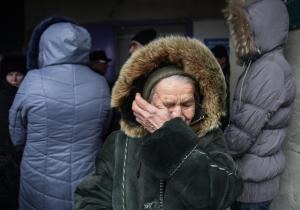
In this picture taken on March 3, 2015, Vera Pavliy, 76 year-old, dressed in a worn-out sheepskin co …
Many, like 36-year old Irina Ryazhenko, travel to Kurakhove or nearby towns several times a month just to withdraw cash. She was told Monday that the new bank card she applied for in August is still not ready.
Making the trip has been complicated in recent weeks by a new requirement for people entering government-held territory to obtain a travel permit to cross back into the rebel-held east — effectively turning them into foreigners in their own country.
For those living just west of Donetsk, applying for a permit requires a bumpy, 35-kilometer (20-mile) drive to a police station in the sleepy town of Velyka Novosilka, held by government forces.
One recent afternoon, around 20 people were lined up glumly outside the station in the damp and cold to ask about the status of their applications. Chatter among those waiting was confined to grumbles about the bureaucratic chaos that often compels applicants to stay away from home for more than 10 days.
When approached by reporters, people clam up in fear that criticism of Ukrainian authorities could see them deprived of the pass. Still, the anger is palpable and talk quickly turns to yelling at the thought of the expenses that are piling up.
View gallery
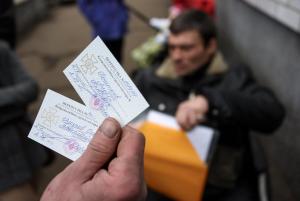
In a picture taken on March 2, 2015, a man holds permits to cross from Ukraine to rebel held territo …
"I came here once and spent 200 hryvnias ($7). I came a second time and spent 200 hryvnias, and it's still not done! Now I have to spend another 200 to get this blasted pass," said one woman from Donetsk, who gave only her first name, Valentina, for fear of having her application rejected. "I'm not a millionaire's daughter. My pension is 1,000 hryvnias."
Others in line said they have been waiting to get their passes for a month. Some are lucky enough to have families in nearby towns and villages that can offer hospitality.
Ukrainian officials insist the permits are a necessary safety precaution for areas bordering rebel territory.
"In the current situation we simply haven't got any other option," said Lt. Colonel Volodymyr Kachanovetsky, an officer with the Border Guards Service in Velyka Novosilka. "We cannot control the situation over there, that's why these additional measures will help to improve the situation there, as well as here."
Alexander, who is wheelchair-bound, lives with his elderly father in the government zone, while his wife and child remain on the other side. He said he needed the permit to travel back to the rebel town of Shakhtarsk and get medical papers allowing him to receive treatment on the Ukrainian side.
View gallery
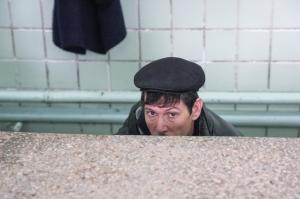
In this picture taken on March 3, 2015, a food vendor sits next to his empty stand at a meat market …
He filed for his permit on Jan. 30. After his documents were lost, he had to file a new application and finally got the permit on Monday.
"I don't know how this is supposed to improve security, but they have made things difficult for people," said Alexander, who asked for his surname to be withheld for fear of prosecution for criticizing the government. "It's just another headache."
Many rebel-held areas have defied expectations of significant food shortages. The shops that did not shut down have until recently been sporadically but adequately stocked.
That began to change in mid-February, according to suppliers and vendors on both sides of the front line. Earlier this week, some 40 goods trucks were parked by a gas station near the government checkpoint outside Kurakhove — the last major hurdle before entering Donetsk.
Ihor Suleiman, a driver from Kharkiv, said he had been waiting for five days to clear that checkpoint.
View gallery
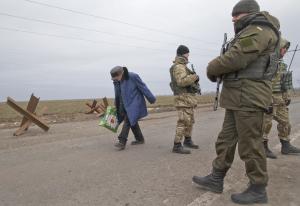
In this picture taken on March 3, 2015, an elderly man crosses a Ukrainian army checkpoint near Kura …
"We drivers have got all the right paperwork, but they still turn us down," he said, referring to the Ukrainian troops. "What can you do? They have guns, and I don't."
While anecdotal evidence of a mounting blockade on the rebel east is abundant, exact figures on the extent to which supplies to the east have dwindled are hard to obtain. But vendors in rebel zones are feeling the heat.
A few large supermarkets in Donetsk appear to be relatively well-stocked, but outdoor markets, smaller grocery stores and pharmacies are struggling.
The second floor of a small grocery store in the city center was closed for business one recent afternoon. There simply weren't enough goods to put on display, shop manager Irina Baranova said.
"The suppliers say the trucks are waiting at checkpoints and are not being allowed through," she said.
View gallery
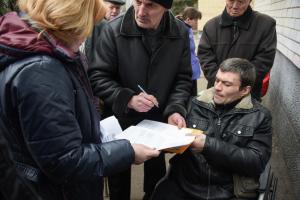
In this picture taken on March 2, 2015, Alexander Nikolayevich, a man in a wheelchair holds an appli …
Baranova's store had dairy, bread, alcohol and tinned goods on display, but juice and bottled water were nowhere to be seen.
A pharmacist at a drugstore a few miles away said no supplies had been brought in for a week. As prices for medicine increase almost daily, customers have been hoarding whatever is available, she said.
Kachanovetsky, the Ukrainian border official, made the procedure for getting through checkpoints sound simple. Tax officials inspect the cargo and check drivers' documents and give the green light to all those with the right documentation, he said.
Evidence on the ground suggests things are not that easy.
At Donetsk's sprawling, domed Soviet-era food market, rows of stalls where farmers once sold their produce and cheerfully plied would-be customers stand empty and silent.
One of the remaining vendors, meat farmer Vladimir Vasko, sells his own wares as well as goods delivered from the government side.
"It has never been like this before," said Vasko, who could only offer the traditional Ukrainian lard called "salo." ''It was tough but manageable before. Now we have no goods, the warehouses are empty."